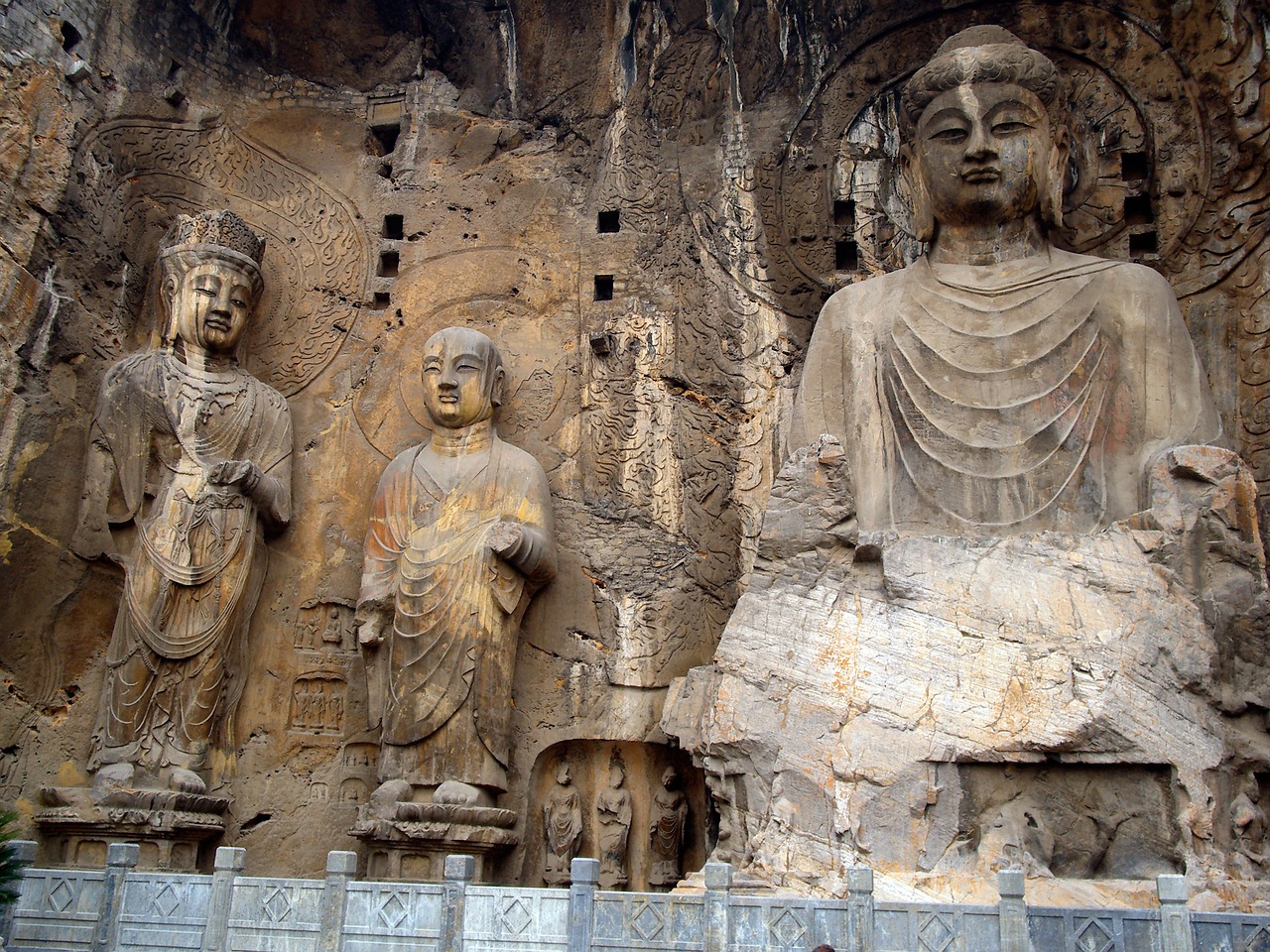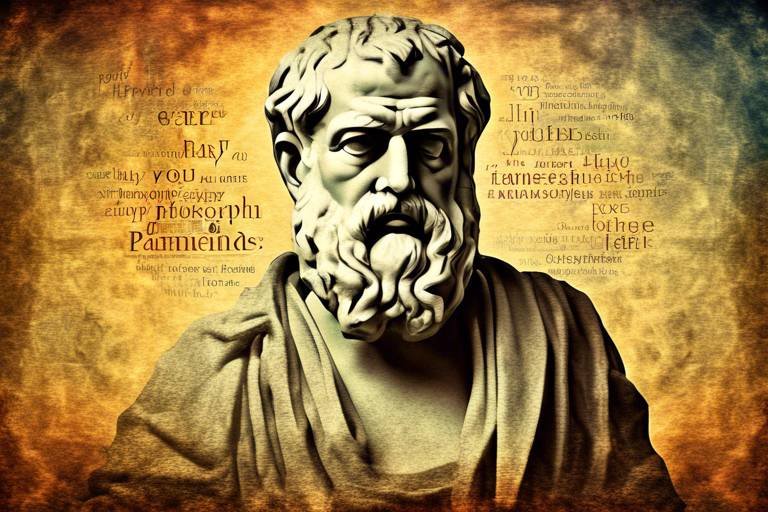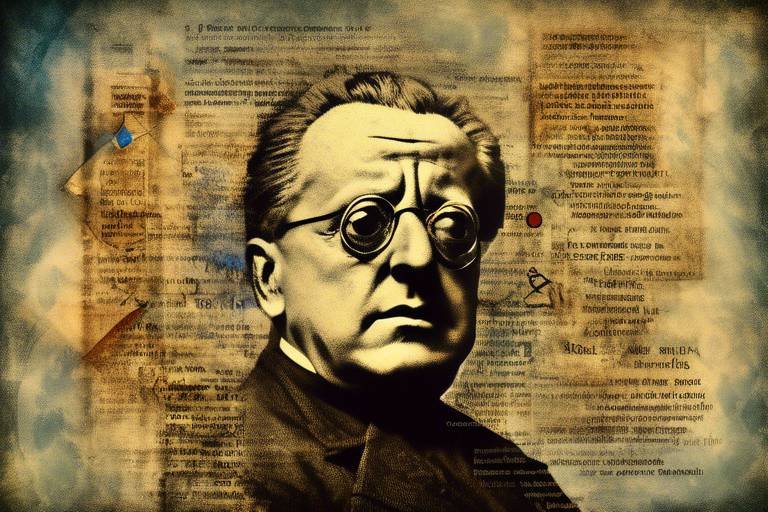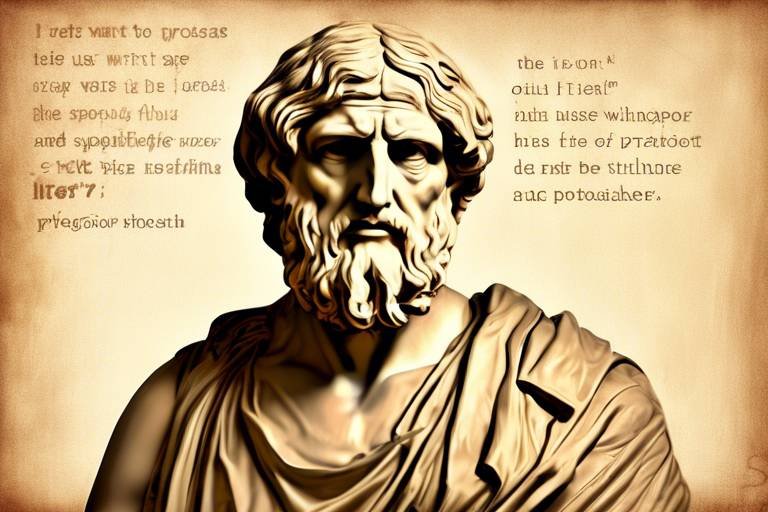Exploring Marxist Philosophy through Antonio Gramsci’s Prison Notebooks
In the realm of political theory, few figures stand as tall as Antonio Gramsci. His work, particularly the Prison Notebooks, offers a profound exploration of Marxist philosophy that resonates even today. But what makes Gramsci's perspective so unique? Why should we care about his thoughts on hegemony and organic intellectuals in our contemporary world? This article delves into the essence of Gramsci's ideas, shedding light on their relevance and impact on modern social and political thought.
Gramsci wrote his notebooks while imprisoned by the Fascist regime in Italy, a time when the political landscape was fraught with turmoil and oppression. His writings are not just a reflection of his personal struggles but also a deep engagement with the socio-political context of his time. Understanding this backdrop is crucial, as it informs the revolutionary spirit that permeates his work. Gramsci's insights challenge the status quo, urging us to rethink power dynamics and the role of culture in shaping societal norms.
As we navigate through Gramsci's key concepts, we will uncover how he redefined traditional Marxist ideas. His concept of hegemony stands out, illustrating how cultural dominance can be more effective than sheer force in maintaining power. This notion invites us to examine the subtle ways in which consent is manufactured in society, making it a vital tool for activists and theorists alike. Furthermore, Gramsci's notion of organic intellectuals emphasizes the importance of voices emerging from within the working class, advocating for a more inclusive understanding of class consciousness.
In this exploration, we will also touch upon Gramsci's lasting influence on contemporary Marxism. His theories have transcended their historical context, finding new life in modern political movements and cultural studies. The integration of his ideas has transformed how we understand the interplay between culture and power, making his work essential for anyone interested in the dynamics of social change.
As we proceed, we will outline not only the foundational elements of Gramsci's philosophy but also the critiques that have emerged in response to his ideas. By examining these critiques, we can appreciate the ongoing discussions within Marxist and post-Marxist thought, ensuring that Gramsci's legacy remains a vibrant part of our intellectual landscape.
- What is the significance of Gramsci's Prison Notebooks?
Gramsci's Prison Notebooks are significant as they provide insights into the interplay of culture and power, emphasizing the importance of hegemony and the role of organic intellectuals in societal change. - How does Gramsci's concept of hegemony differ from domination?
Gramsci's concept of hegemony involves the consent of the governed and cultural leadership, while domination refers to outright coercion without the need for consent. - Why are organic intellectuals important?
Organic intellectuals are crucial because they articulate the experiences and struggles of their social classes, fostering a greater awareness and class consciousness among the masses. - How has Gramsci influenced contemporary political movements?
Gramsci's ideas continue to inspire activists and theorists, particularly in understanding how cultural narratives shape social movements and political strategies today.

Understanding Gramsci's Historical Context
Antonio Gramsci penned his influential Prison Notebooks during a period of significant upheaval in Italy, specifically the 1920s and 1930s. This was a time marked by the rise of fascism, economic instability, and intense class struggles. To fully grasp the depth of Gramsci's thoughts, it's crucial to understand the socio-political climate that shaped his ideas. Italy was grappling with the aftermath of World War I, where the promise of social change and workers' rights clashed with the harsh realities of political repression and economic hardship.
The Italian Socialist Party was gaining momentum, yet it found itself divided, struggling to unite various factions that had differing ideologies and objectives. This division rendered the working class vulnerable to the encroaching fascist regime led by Benito Mussolini. Gramsci, a member of the Italian Communist Party, witnessed firsthand the devastating effects of political fragmentation and the failure of the left to mount a cohesive resistance against fascism.
In this context, Gramsci developed his theories as a response to the challenges of his time. He believed that traditional Marxist approaches were inadequate to explain the complexities of power and culture in modern society. Instead of merely focusing on economic factors, Gramsci emphasized the importance of cultural hegemony—the way in which dominant classes maintain control not just through force, but through the consent of the governed. This insight was revolutionary, as it shifted the focus from mere economic exploitation to the broader cultural and ideological mechanisms that underpin societal structures.
Moreover, Gramsci's imprisonment in 1926 by the Mussolini regime profoundly influenced his writing. His confinement not only limited his physical freedom but also allowed him the time to reflect deeply on the nature of power, culture, and resistance. The notebooks became a space for him to articulate his thoughts on the role of intellectuals in society, the necessity of a counter-hegemonic culture, and the potential for revolutionary change from within the oppressed classes.
Gramsci’s work serves as a lens through which we can analyze the dynamics of power and resistance in contemporary society. Understanding the historical context of his writings allows us to appreciate why he emphasized the importance of organic intellectuals—individuals who arise from within the working class to articulate their struggles and aspirations. This concept is particularly relevant today as social movements continue to seek voices that resonate with their lived experiences.
In summary, Gramsci's historical context is a tapestry woven with threads of political turmoil, class struggle, and cultural transformation. His insights remain vital for understanding not only the past but also the ongoing battles for social justice and equality in our current era.

Key Concepts in Gramsci’s Thought
Antonio Gramsci's contributions to Marxist theory are both profound and complex, offering a fresh lens through which to view social dynamics. His writings in the Prison Notebooks introduce several key concepts that have become foundational in understanding not just Marxism, but the broader socio-political landscape. Among these pivotal ideas are hegemony and organic intellectuals, both of which challenge traditional notions of power and class struggle.
To grasp Gramsci's philosophy, one must first understand the concept of hegemony. Unlike the conventional view of power as a top-down force exerted through coercion, Gramsci posits that power is also maintained through cultural and ideological means. He argues that the ruling class secures its dominance not solely through force but by winning the consent of the governed. This means that the values, beliefs, and norms propagated by the dominant class become accepted as the norm by the wider society. Thus, hegemony is not just about control; it is about shaping the very fabric of societal consciousness.
Hegemony, in Gramsci's terms, is a dynamic process that requires constant negotiation and reinforcement. It reflects the intricate interplay between consent and coercion. For instance, consider how popular culture often reflects the interests of the ruling class while simultaneously appearing to serve the broader public. This duality allows the dominant class to maintain its power while appearing benevolent. Gramsci's insights compel us to question the narratives we consume and to recognize the underlying power structures at play.
Gramsci makes a crucial distinction between hegemony and mere domination. While domination relies on coercive power—think of a dictator ruling through fear—hegemony emphasizes the role of cultural leadership and the subtle art of persuasion. In this light, revolutionary strategies must not only seek to dismantle oppressive systems but also to build alternative narratives that resonate with the masses. This understanding is vital for any movement aiming for lasting change, as it highlights the necessity of winning hearts and minds, not just battles.
The relevance of Gramsci's concept of hegemony is evident in contemporary social movements. Activists today often strive to shift public perception and cultural narratives to challenge systemic injustices. For example, movements like Black Lives Matter and climate activism employ strategies aimed at reshaping societal values and norms. By fostering a new collective consciousness, these movements aim to create a new hegemony that supports their causes. In this way, Gramsci's ideas remain a powerful tool for understanding and engaging with the complexities of modern activism.
Another critical aspect of Gramsci's thought is the notion of organic intellectuals. He argues that every social class produces its own intellectuals, who emerge from the very fabric of that class. These organic intellectuals play a vital role in articulating the experiences and aspirations of their peers. They are not merely academics; rather, they are individuals who understand the struggles of their communities and can effectively communicate those struggles to a broader audience. This concept underscores the importance of grassroots leadership in fostering class consciousness and driving social change.
In summary, Gramsci's key concepts, particularly hegemony and organic intellectuals, challenge us to rethink the nature of power and resistance. They remind us that social change is not just about overthrowing a regime but also about transforming the cultural narratives that underpin our societies. As we navigate the complexities of contemporary political landscapes, Gramsci's insights continue to resonate, providing a roadmap for understanding and engaging with the ongoing struggles for justice and equality.
- What is hegemony in Gramsci's philosophy?
Hegemony refers to the dominance of one social class over others through cultural and ideological means, rather than solely through coercion. - How do organic intellectuals contribute to social change?
Organic intellectuals emerge from within social classes and articulate their experiences, fostering class consciousness and driving movements for change. - Why is Gramsci's work still relevant today?
Gramsci's insights into power dynamics and cultural narratives provide valuable frameworks for understanding contemporary social movements and political strategies.

The Concept of Hegemony
When we dive into Antonio Gramsci's concept of hegemony, we're stepping into a realm where culture and power intertwine in fascinating ways. Hegemony, in Gramsci's view, is not merely about one class exerting control over another through brute force; rather, it is a complex dance of consent, persuasion, and cultural leadership. To put it simply, hegemony is the ability of a dominant group to shape the beliefs, values, and norms of society in a way that maintains their power while making it seem natural and inevitable.
Imagine a puppet master pulling strings, but instead of visible strings, there are ideologies and cultural narratives that guide the thoughts and actions of the masses. Gramsci argued that this form of control is more effective and sustainable than outright domination. The ruling class doesn’t just impose its will; it creates a worldview that aligns with its interests, making the status quo appear as the common sense of the time. This is where hegemony shines—it operates in the shadows, subtly influencing how people perceive their reality.
Gramsci's notion of hegemony can be broken down into several key components:
- Consent: Unlike domination, which relies on coercion, hegemony is rooted in the consent of the governed. People accept the dominant ideology, often without realizing it.
- Cultural Leadership: The ruling class maintains its power by promoting cultural narratives that resonate with the masses, effectively winning their hearts and minds.
- Ideological State Apparatus: Institutions such as schools, media, and religious organizations play a crucial role in disseminating the dominant ideology, shaping public consciousness.
The implications of hegemony are profound. It challenges the traditional Marxist view that revolution is solely a matter of economic power. Instead, Gramsci suggests that to achieve true social change, one must first engage in a struggle for ideas and cultural dominance. This perspective opens up new avenues for revolutionary thought and action, emphasizing the importance of cultural engagement in political movements.
In essence, hegemony is about the struggle for cultural supremacy. It’s a reminder that power is not just about who holds the reins of government but also about who shapes the narrative of society. Understanding this concept is crucial for anyone interested in the dynamics of power, as it reveals the subtle yet powerful ways in which ideologies can govern our lives.

Hegemony vs. Domination
When we dive into Antonio Gramsci's philosophy, the distinction between hegemony and domination emerges as a cornerstone of his thought. Gramsci argues that traditional ideas of power often focus solely on domination, which is the straightforward coercion or force exerted by one group over another. This perspective is akin to a king ruling over his subjects with an iron fist, where compliance is achieved through fear and oppression. However, Gramsci takes us deeper, suggesting that real power lies not just in force, but in the subtle arts of persuasion and cultural leadership.
In Gramsci's view, hegemony is a more sophisticated form of control. It involves the ability of a dominant class to secure the consent of the subordinate classes, shaping their beliefs, values, and norms through cultural institutions like education, media, and religion. Think of it as a well-crafted narrative that aligns the interests of the ruling class with those of the masses, creating a sense of shared identity and purpose. This is why Gramsci emphasizes the importance of cultural hegemony—the idea that the ruling class's worldview becomes the accepted norm, making it seem natural and inevitable.
To illustrate this distinction further, let’s break it down into a simple comparison:
| Aspect | Hegemony | Domination |
|---|---|---|
| Method of Control | Consent through cultural influence | Force and coercion |
| Nature of Power | Subtle and pervasive | Direct and overt |
| Example | Media shaping public opinion | Military intervention |
This distinction is crucial, especially when considering revolutionary strategies. Gramsci argues that simply overthrowing a regime through force (domination) is not enough for genuine change. Instead, a successful revolution requires the establishment of a new hegemony—one that resonates with the everyday experiences and aspirations of the working class. This means that revolutions must not only dismantle existing power structures but also create new narratives and cultural frameworks that empower the oppressed.
In contemporary society, we can observe the relevance of this distinction in various social movements. For instance, movements advocating for racial equality or climate justice often utilize cultural narratives to gain support and reshape public perceptions. They seek to create a new hegemony that challenges the prevailing norms and values upheld by those in power. This approach highlights the importance of cultural engagement and the need for a collective consciousness that recognizes the interconnectedness of struggles across different social spheres.
In conclusion, Gramsci's differentiation between hegemony and domination provides a nuanced understanding of power dynamics. It reminds us that the battle for social change is not just about overthrowing the oppressor but also about winning hearts and minds through cultural engagement. The implications of this understanding can guide contemporary movements in their quest for justice and equality.

Practical Applications of Hegemony
Understanding the concept of hegemony is crucial for grasping its practical applications in today's social and political landscapes. Gramsci's notion of hegemony extends beyond mere political control; it encapsulates the idea that power can be maintained through cultural and ideological means. This is particularly relevant in contemporary society where cultural narratives often shape public opinion and influence political outcomes. For instance, social movements today leverage the idea of hegemony to challenge dominant narratives and advocate for change. By understanding how cultural hegemony operates, activists can craft messages that resonate with broader audiences, thus shifting the ideological landscape.
One of the most significant applications of hegemony can be seen in the realm of social movements. Groups advocating for environmental justice, racial equality, and workers' rights often employ strategies that seek to shift public perception and gain consent from the masses. They aim to establish a new cultural narrative that aligns with their goals, thereby creating a counter-hegemonic stance against established power structures. For example, the Black Lives Matter movement has effectively utilized social media to disseminate its message, challenging the hegemonic narratives surrounding race and policing in America.
Moreover, hegemony plays a vital role in political campaigns. Candidates and political parties often engage in cultural battles to define the terms of the political discourse. They do this by promoting certain values, symbols, and ideologies that resonate with the electorate. This can be seen in how politicians frame issues like healthcare, immigration, and climate change. By crafting a narrative that aligns with the public's values, they can secure consent and maintain dominance over political discourse.
To illustrate the practical applications of hegemony, consider the following table that summarizes different areas where hegemony is effectively utilized:
| Area | Application of Hegemony |
|---|---|
| Social Movements | Shifting public perception through cultural narratives to advocate for change. |
| Political Campaigns | Framing issues in a way that resonates with voters to secure electoral support. |
| Media Influence | Controlling narratives in media to shape public opinion and cultural understanding. |
| Education | Curriculum design that promotes specific ideologies and worldviews. |
In addition to social movements and political campaigns, hegemony also manifests in the media. Media outlets often play a crucial role in shaping public discourse by controlling the narratives that dominate news cycles. By selecting which stories to highlight and how to frame them, media organizations can reinforce existing power structures or challenge them. This is evident in the way certain issues gain prominence while others are marginalized, reflecting the hegemony of particular viewpoints.
Finally, the concept of hegemony can also be applied in education. The curricula taught in schools can perpetuate dominant ideologies, shaping the worldview of future generations. By critically examining educational content, we can uncover the underlying hegemonic narratives that influence how history, culture, and social issues are presented. This understanding allows educators and policymakers to create more inclusive and representative educational environments.
In conclusion, the practical applications of hegemony are vast and multifaceted. By recognizing how cultural narratives shape our understanding of power and influence, we can better navigate the complexities of contemporary social and political life. Gramsci's insights remain profoundly relevant, providing a framework for analyzing and challenging the status quo in our ongoing quest for social justice and equity.

Organic Intellectuals
Antonio Gramsci's concept of is a fascinating and critical element of his philosophical framework, particularly as it relates to class struggle and social change. Unlike traditional intellectuals, who often emerge from elite backgrounds and may be disconnected from the realities of the working class, organic intellectuals arise from within social classes themselves. They are the voices of their communities, articulating the lived experiences, struggles, and aspirations of their peers. This idea is vital because it emphasizes that knowledge and understanding are not solely the domain of academia but can be found in everyday life and grassroots movements.
Gramsci believed that organic intellectuals play a crucial role in fostering class consciousness. They help to bridge the gap between theory and practice, ensuring that the experiences of the working class are not only heard but also translated into political action. By doing so, they challenge the prevailing narratives shaped by dominant classes and offer alternative viewpoints that resonate with the masses. This process of articulation is essential for mobilizing people around shared goals, ultimately contributing to the broader struggle against oppression.
To illustrate the significance of organic intellectuals, consider the following points:
- Connection to the Community: Organic intellectuals are deeply rooted in their communities, making them more relatable and trustworthy in the eyes of their peers.
- Empowerment through Knowledge: By sharing their insights and experiences, they empower others to recognize their own potential and the systemic barriers they face.
- Facilitators of Change: They often act as catalysts for social movements, helping to organize and mobilize individuals towards collective action.
Gramsci's notion of organic intellectuals challenges the traditional view of intellectualism, suggesting that anyone who engages critically with their social context can be an intellectual. This democratization of knowledge is vital in contemporary society, where many feel disenfranchised and disconnected from political discourse. By elevating the voices of those who have been historically marginalized, organic intellectuals can reshape the narrative and drive meaningful change.
In today's world, we see the emergence of organic intellectuals in various movements, from grassroots activism to community organizing. These individuals often leverage social media and other platforms to amplify their voices, creating networks of solidarity and support. Whether it's through art, literature, or direct action, their contributions are invaluable in challenging the status quo and advocating for a more equitable society.
In summary, organic intellectuals are not just thinkers; they are doers, actively engaging in the struggle for social justice and equality. Their role is essential in the ongoing quest for liberation, as they embody the idea that knowledge is power and that everyone has the right to contribute to the discourse that shapes their lives.
1. What are organic intellectuals?
Organic intellectuals are individuals who emerge from within a social class and articulate the experiences and struggles of their community, playing a crucial role in fostering class consciousness and mobilizing for social change.
2. How do organic intellectuals differ from traditional intellectuals?
Unlike traditional intellectuals, who often come from elite backgrounds and may lack direct experience with the struggles of the working class, organic intellectuals are deeply rooted in their communities and are more relatable to their peers.
3. Why are organic intellectuals important in contemporary society?
Organic intellectuals are vital because they democratize knowledge, empower marginalized voices, and facilitate social movements that challenge systemic oppression and advocate for social justice.

Gramsci's Influence on Contemporary Marxism
Antonio Gramsci's profound insights have left an indelible mark on the landscape of contemporary Marxism. His work has not only expanded the boundaries of Marxist theory but has also provided a robust framework for understanding the complexities of modern society. Gramsci's ideas resonate deeply in various political movements, academic discourses, and cultural critiques, illustrating their enduring relevance.
One of the most significant areas where Gramsci's influence can be observed is in the realm of social movements. His concept of hegemony has become a vital tool for activists seeking to challenge the status quo. By recognizing that power extends beyond mere coercion to encompass cultural influence, contemporary movements can strategize more effectively. For instance, movements advocating for social justice or environmental sustainability often utilize Gramsci’s ideas to foster a broader consensus among diverse groups, thereby enhancing their collective strength.
Moreover, Gramsci's notion of organic intellectuals has revitalized discussions on the role of intellectuals in society. Unlike traditional intellectuals who may be detached from the struggles of the working class, organic intellectuals emerge from the very communities they represent. This has inspired a new generation of thinkers and activists who prioritize grassroots engagement and emphasize the importance of lived experiences in shaping political discourse. As a result, we see a shift toward more inclusive and representative forms of activism, which are crucial in today's multicultural societies.
Gramsci's impact extends into the academic sphere as well, particularly within cultural studies. His theories encourage scholars to examine culture as a site of struggle, where various social forces compete for dominance. This perspective has led to a richer understanding of how culture shapes and is shaped by power dynamics. For example, contemporary analyses of media representation, identity politics, and consumer culture often draw on Gramsci's work to critique the underlying ideologies that perpetuate inequality.
However, Gramsci’s philosophy is not without its critiques. Some scholars argue that his focus on culture may downplay the significance of economic factors in shaping societal structures. Others contend that his ideas can be overly deterministic, suggesting that cultural hegemony inevitably leads to social conformity. Nevertheless, these critiques have sparked vibrant debates that continue to enrich Marxist and post-Marxist thought, demonstrating that Gramsci's work remains a catalyst for discussion and exploration.
In summary, Antonio Gramsci’s influence on contemporary Marxism is profound and multifaceted. His concepts of hegemony and organic intellectuals provide critical insights that empower social movements and academic inquiries alike. As we navigate the complexities of modern society, Gramsci’s legacy serves as a reminder of the power of ideas in shaping our world. His work encourages us to remain vigilant and engaged, recognizing that the struggle for social justice and equality is ongoing and requires both intellectual rigor and grassroots activism.
- What is hegemony in Gramsci's context? Hegemony refers to the dominance of one social class over others, achieved not just through force but through cultural and ideological means.
- Who are organic intellectuals? Organic intellectuals are individuals who arise from specific social classes and articulate their experiences and needs, helping to foster class consciousness.
- How has Gramsci influenced modern social movements? Gramsci’s ideas on hegemony and organic intellectuals have provided frameworks for activists to build consensus and engage more effectively with diverse communities.
- What critiques exist regarding Gramsci’s philosophy? Critics argue that Gramsci’s emphasis on culture may overshadow economic factors, and some believe his theories can be overly deterministic.

Gramsci and Cultural Studies
Antonio Gramsci's influence on cultural studies is profound and multifaceted, reshaping how we perceive the intricate relationship between culture and power. By intertwining his theories with cultural analysis, scholars have been able to delve deeper into the ways in which cultural artifacts and practices reflect and perpetuate social hierarchies. Gramsci's concept of hegemony, in particular, serves as a critical lens through which we can examine the subtle mechanisms of consent and coercion that operate within society.
To understand this influence, it’s essential to recognize that Gramsci viewed culture not merely as a reflection of economic conditions but as a battleground for ideological struggle. In his view, culture plays a pivotal role in maintaining the dominance of a particular class, influencing people's beliefs and values in ways that often go unnoticed. This leads to a fascinating exploration of how cultural products—be it literature, film, or music—can serve as tools for both oppression and liberation.
Gramsci argued that dominant cultural narratives are often presented as universal truths, masking the specific interests of the ruling class. This notion has paved the way for cultural studies scholars to analyze how various forms of media contribute to the construction of social identities and power relations. For instance, when examining popular television shows or blockbuster films, one might ask: Who is represented, and whose voices are marginalized? Such questions are crucial for unpacking the ideological underpinnings of cultural texts.
Moreover, Gramsci's emphasis on the role of organic intellectuals—those who emerge from the working class to articulate their experiences—has inspired a new wave of cultural criticism. These individuals act as bridges between the elite and the masses, helping to foster a critical consciousness that challenges dominant ideologies. In contemporary cultural studies, this idea encourages the examination of grassroots movements and local narratives that resist mainstream representations.
In summary, Gramsci's contributions to cultural studies extend beyond mere theoretical frameworks; they provide a robust methodology for analyzing how culture functions within the web of social relations. By applying Gramsci's insights, scholars can better understand the complexities of cultural production and the ways in which it shapes our collective consciousness. As we continue to navigate an increasingly mediated world, Gramsci's ideas remain ever-relevant, inviting us to question the status quo and consider the potential for cultural resistance.
- What is hegemony in Gramsci's philosophy? Hegemony refers to the dominance of one social class over others, achieved not just through coercion but through cultural means that secure consent from subordinate classes.
- How do organic intellectuals contribute to social change? Organic intellectuals arise from within the working class and articulate their experiences, fostering class consciousness and challenging dominant narratives.
- Why is Gramsci important for cultural studies? Gramsci's theories help analyze the relationship between culture and power, revealing how cultural artifacts can both reinforce and challenge societal norms.
- Can Gramsci's ideas be applied to modern social movements? Yes, his concepts of hegemony and organic intellectuals provide valuable insights into contemporary social movements, highlighting the importance of cultural strategies in achieving political change.

Critiques of Gramsci’s Philosophy
Antonio Gramsci's philosophy, particularly as articulated in his Prison Notebooks, has undeniably left a profound mark on Marxist theory and political thought. However, like any influential thinker, Gramsci's ideas have not escaped scrutiny. Critics have raised several points of contention regarding his concepts, particularly concerning hegemony and organic intellectuals. One of the primary critiques revolves around the notion that Gramsci overemphasizes the role of culture in maintaining power dynamics. Detractors argue that by focusing so heavily on cultural hegemony, Gramsci risks downplaying the importance of economic structures and material conditions in shaping societal relations.
Another significant critique is the perceived vagueness of his definitions. For instance, the concept of hegemony can sometimes appear nebulous, making it challenging to apply in concrete political contexts. Critics suggest that without clear parameters, the term can be manipulated or misinterpreted in various ways. This ambiguity raises questions about the practical utility of Gramsci's theories in real-world political movements. Additionally, some scholars argue that Gramsci's emphasis on consent and cultural leadership may lead to a form of political complacency, where the focus becomes more about winning hearts and minds rather than addressing systemic inequalities directly.
Moreover, Gramsci's idea of organic intellectuals has also faced criticism. Some argue that this concept can inadvertently create a divide between intellectuals and the working class, suggesting that only those with a certain level of education or social standing can articulate the experiences of the proletariat. This perspective may alienate those who do not fit this mold, thereby undermining the very class consciousness Gramsci sought to foster. Critics contend that this elitism could dilute the revolutionary potential of grassroots movements, as it places intellectuals in a position of authority that may not always resonate with the lived experiences of ordinary people.
In addition to these critiques, there are also broader discussions about the relevance of Gramsci's theories in today's context. Some scholars question whether his insights into cultural hegemony and the role of intellectuals are sufficient to address the complexities of contemporary capitalism, which is characterized by rapid technological changes and global interconnectedness. As the political landscape evolves, the challenge remains: can Gramsci's ideas be adapted to meet the demands of a world that is increasingly shaped by digital culture and neoliberal policies?
Despite these critiques, Gramsci's work continues to be a vital reference point for those engaged in Marxist and post-Marxist thought. His ability to intertwine culture with politics offers a rich framework for analyzing power dynamics in society. Ultimately, the ongoing debates surrounding his philosophy not only highlight its complexity but also affirm its relevance in contemporary discourse. Engaging with these critiques allows for a deeper understanding of Gramsci's contributions and encourages a more nuanced approach to Marxist theory as we navigate the challenges of the 21st century.
- What is Gramsci's concept of hegemony? Gramsci's concept of hegemony refers to the dominance of one social class over others, achieved not merely through coercion but through cultural and ideological means that secure consent from the subordinate classes.
- How does Gramsci's idea of organic intellectuals differ from traditional intellectuals? Organic intellectuals emerge from within social classes and articulate the experiences and struggles of their peers, contrasting with traditional intellectuals who may not have direct ties to the working class.
- Why is Gramsci's work still relevant today? Gramsci's insights into culture and power dynamics continue to inform contemporary social movements and political strategies, providing tools for understanding and challenging systemic inequalities.
Frequently Asked Questions
- What is the main focus of Antonio Gramsci's Prison Notebooks?
Antonio Gramsci's Prison Notebooks primarily focus on the concept of hegemony and its role in social and political dynamics. Gramsci argues that power is not just maintained through force but also through cultural dominance and consent. His writings explore how social classes can achieve and maintain control through cultural means, making it a crucial text for understanding contemporary Marxist thought.
- How does Gramsci define hegemony?
Gramsci defines hegemony as the dominance of one social class over others, achieved not merely through coercion but through the consent of the governed. This means that cultural and ideological leadership plays a significant role in maintaining power. Hegemony, according to Gramsci, involves the ability of a ruling class to shape societal norms and values, thus securing the support of the majority.
- What are organic intellectuals, and why are they important?
Organic intellectuals are individuals who emerge from within a social class and articulate the experiences and struggles of that class. Gramsci believed that these intellectuals play a vital role in fostering class consciousness and mobilizing social movements. They bridge the gap between theory and practice, helping to transform the lived experiences of their communities into a broader political discourse.
- How does Gramsci's concept of hegemony apply to modern social movements?
Gramsci's concept of hegemony is highly relevant to contemporary social movements as it emphasizes the importance of cultural strategies in achieving political goals. Modern movements often seek to reshape societal values and norms to gain broader support. By understanding and applying Gramsci's ideas, activists can create narratives that resonate with the public, thereby building a coalition that transcends traditional class boundaries.
- What critiques have been made against Gramsci's philosophy?
Gramsci's philosophy has faced several critiques, particularly regarding its applicability and the complexity of its concepts. Critics argue that his ideas may oversimplify the dynamics of power and neglect the role of economic factors. Others suggest that the emphasis on cultural hegemony might lead to a focus on ideological battles at the expense of addressing material conditions. These critiques continue to fuel discussions within Marxist and post-Marxist circles.



















